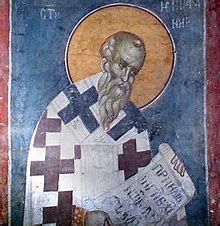
MAY 12 is the traditional memorial of ST. EPIPHANIUS, BISHOP OF SALAMIS (+403).
This Epiphanius was a man of distinct personality. His lack of moderation and judgment were eclipsed by his zeal and learning. He was well loved for his obvious sanctity. But he argued long and well regarding anything that smelled of heresy. His own principals were discredited by their harshness.
Epiphanius was descended from the Christians of Judeo-Greek heritage. He was born around 315 in the village of Besanduk, near the city of Eleutheropolis, Palestine. It is now Israel.
As a young man, he studied and practiced monasticism in Egypt, but then returned to Eleutheropolis by the time he was 20. About that time, he established a monastery and became its superior.
Known well for his learning, Epiphanius was named bishop of Constantia (Salamis) Cyprus in 367. He spent the rest of his life in that post. He also became Metropolitan of Cyprus. In that capacity, the bishop spread the practice of monasticism and campaigned against heresies.
One of his greatest challenges was dealing with Emperor Valens (364-378), who was in power when the saint attained his bishopric. Epiphanius was a strictly orthodox Christian. Valens supported the Arian heresy. Being in Valens’ jurisdiction (Empire of the East), the bishop could have been in severe trouble. But his people loved him for his sanctity and protected him from any serious interaction with the emperor.
Epiphanius traveled widely, supporting the orthodox positions of the day. He attended the synod of Antioch in 376, discussing the Trinity, and the Council of Rome in 382, arguing Arianism vs orthodoxy.
A writer, Epiphanius is noted for two major works. His opus, Panarion, is a description of 80 known heresies and refutations of each. His book, Ancoratus, is a synopsis of the teachings of the Church, written from the point of view of a very orthodox preacher. Many historians use his first book as a reference on heresies and a source of quotes of lost works.
As time went on, Epiphanius became somewhat of an iconoclast, writing to Bishop John of Jerusalem saying that images were “opposed….to our religion”. He was known to have torn down a curtain in a church in Palestine on which was an image of Christ, or a saint. Likewise, he preached against Origen, implying that he was a philosopher, not a theologian.
In a continuation of the Origen argument, in 402, Bishop Theophilus of Alexandria wanted St. John Chrysostom of Constantinople to be deposed. He rigged an argument saying that St. John was supporting monks who followed Origen’s teachings. Theophilus called for a synod to discuss a punishment. Epiphanius was invited and boarded a ship for Constantinople. After reviewing new information, he decided that the argument was incorrect and that St. John was innocent. He had the ship turn around and go back to Cyprus.
He never made it home. He died at sea.
“God gives not the kingdom of heaven except on condition we labor; and all we can do bears no proportion to the crown we are striving for”–St. Epiphanius

Recent Comments